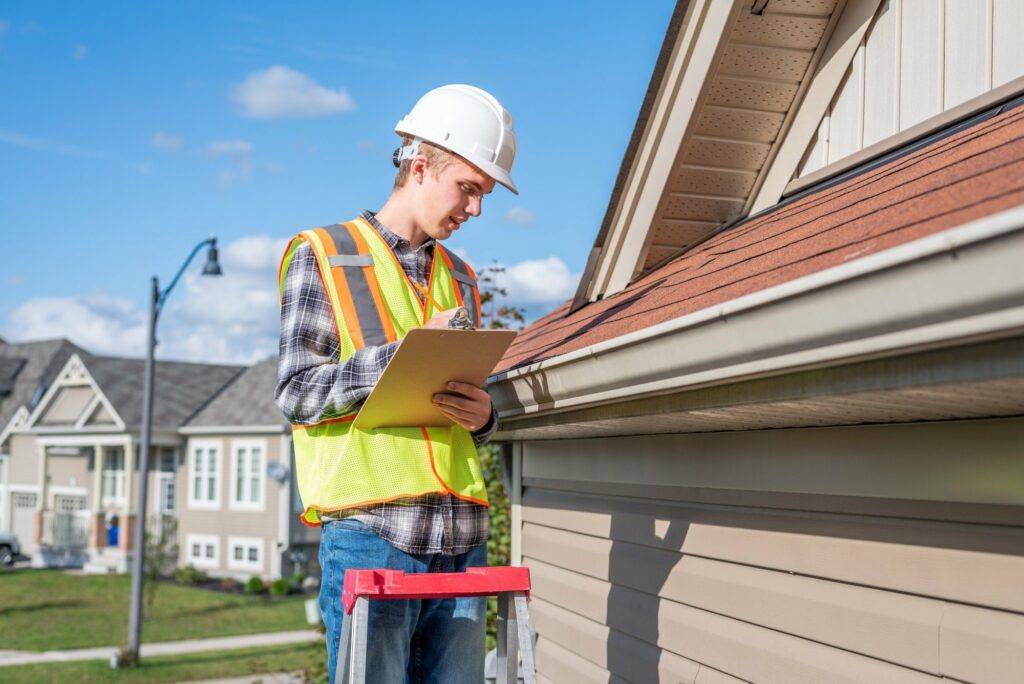
You’re in sunny Florida, proud owner of a dream home, but lurking beneath the surface are potential issues that could turn your paradise into a costly nightmare. What’s your best defense? Knowing exactly what is a 4-point inspection in Florida.
This isn’t just a routine check-up. It’s your home’s health report, crucial for anyone in the Sunshine State. A 4-point inspection gets deep into the core elements of your home to uncover what’s hidden from the naked eye.
Think of it as a crystal ball that reveals the current condition of your home and predicts future expenses. In a place where the weather can be as unpredictable as a roll of the dice, understanding the ins and outs of these inspections is essential for safeguarding your haven and your wallet.
What Is a 4-Point Inspection in Florida?
A 4-point inspection in Florida is like a health check for your home. It’s a detailed examination of the four critical systems of a house: HVAC, electrical, plumbing, and the roof. This inspection is a crucial process that can have significant impacts on your home’s safety and value.
Florida’s Climate and Environmental Factors
The history and significance of 4-point inspections in Florida are deeply rooted in the state’s unique environmental and climatic challenges. Florida’s climate is characterized by long, hot summers and short, mild winters.
This unique weather pattern places significant stress on homes. The intense heat and humidity can accelerate wear and tear, making regular inspections vital to ensure systems are functioning correctly and efficiently.
Florida is also known for its susceptibility to natural disasters, particularly hurricanes and tropical storms. These events bring strong winds and heavy rainfall, which test the durability and integrity of homes.
Insurance Requirements
Historically, 4-point inspections gained importance due to insurance requirements. In the wake of devastating hurricanes and the rising costs of insurance claims, many insurance companies in Florida began requiring these inspections for homes over a certain age.
This requirement ensures that the fundamental components of a home are in good working condition to reduce the risk of future insurance claims.
Changing Building Codes
Over the years, Florida has seen changes and updates in building codes, especially after significant hurricane events. These updates often include stricter standards for construction and renovations. Particularly for aspects like roofing and electrical systems.
4-point inspections help ensure that older homes meet these updated standards, or at least identify areas that need improvement to enhance safety and compliance.
The Growth of the Real Estate Market
Florida’s real estate market has seen significant growth and changes. As more people move to the state, the demand for housing increases. This includes older homes that may need more maintenance.
4-point inspections provide potential buyers with an understanding of what they’re investing in.
Components of a 4-Point Inspection
What is a 4-point inspection exactly? A 4-point inspection is a thorough examination of a home’s essential systems. It’s designed to give Florida homeowners a clear picture of the condition of their property.
HVAC System
In Florida’s climate, air conditioning isn’t just a luxury; it’s a necessity. An HVAC inspection looks at the age, condition, and functionality of your system.
It’s not uncommon for older systems to be less efficient, which can lead to higher utility bills and an increase in home expenses. A study by the National Institute of Standards and Technology found that an improperly functioning HVAC system could increase energy costs by up to 30%.
Electrical System
This includes checking the wiring, the electrical panel, and any safety devices. The importance of this cannot be overstated.
According to the Electrical Safety Foundation, electrical faults are a leading cause of home fires. A thorough inspection can reveal outdated wiring like knob-and-tube or aluminum, which are more prone to overheating and fire hazards.
Plumbing
Plumbing is another critical area. Inspectors examine the pipes, fixtures, and water heater. Faulty plumbing can lead to water damage, mold growth, and even structural issues.
The Insurance Information Institute notes that water damage claims are among the most frequent home insurance claims, which highlights the importance of regular plumbing checks.
Roof
Florida’s weather can be tough on roofs. Inspectors assess the age, material, and condition of the roof. They look for signs of wear, damage, or leaks. A compromised roof not only leads to water damage but also significantly reduces a home’s energy efficiency.
Why 4-Point Inspections are Crucial in Florida
In Florida, the significance of 4-point inspections extends far beyond a mere checklist. These inspections are critical for homeowners in the Sunshine State, especially in relation to home insurance and managing insurance costs.
Protecting Against Florida’s Harsh Weather
One of the most compelling reasons for the necessity of 4-point inspections in Florida is the state’s harsh weather conditions. The state is prone to hurricanes, tropical storms, and intense heat.
These elements can wreak havoc on homes. Particularly if key components like roofs and electrical systems aren’t in optimal condition.
For instance, a weak roof or outdated electrical system can lead to severe damage during a hurricane, which can exponentially increase repair costs. Regular 4-point inspections help identify and rectify these vulnerabilities to fortify homes against Florida’s challenging weather.
4-point Inspection for Home Insurance
A critical aspect of 4-point inspections is their impact on home insurance. In Florida, the findings of a 4-point inspection can significantly influence insurance premiums and coverage options.
Insurers often require these inspections for older homes to assess the risk level. A home with well-maintained systems may qualify for lower insurance premiums, while a home with numerous issues might see higher insurance costs or even difficulties in obtaining insurance.
Real Estate Transactions
In the Florida real estate market, 4-point inspections play a pivotal role in transactions, especially for older homes. These inspections provide both buyers and sellers with an objective evaluation of the home’s condition. They can influence sale prices and negotiation processes.
A home with a recent 4-point inspection report indicating good maintenance can be a strong selling point. It can reassure potential buyers about the condition of the property and possibly expedite the sale process.
Long-Term Savings
While the immediate benefits of 4-point inspections in terms of safety and insurance are evident, there’s also a long-term financial aspect to consider. Regular inspections can identify small issues before they escalate into major problems. They can potentially save homeowners significant amounts in repair costs over time.
Preparing for a 4-Point Inspection
Getting ready for a 4-point inspection is an essential step for homeowners. By preparing adequately, you can enhance your home’s safety, potentially improve your home condition, and even positively influence your interactions with your homeowners insurance company.
Inspect Your HVAC System
Begin by checking your HVAC system. Ensure it’s clean and functioning efficiently. Change or clean filters, look for any signs of leaks or damage, and listen for unusual noises when the system is running.
If it’s been a while since your last professional service, consider scheduling a maintenance check.
Evaluate the Electrical System
Safety is paramount when it comes to your home’s electrical system. Check your electrical panel for any signs of rust or damage. Ensure that all switches and outlets are functioning correctly and there are no exposed wires.
If you have an older home, it’s wise to know the type of wiring you have. Older wiring systems, like knob-and-tube, might need an upgrade to meet current safety standards.
Plumbing Check-Up
For the plumbing, look for any visible leaks or signs of water damage under sinks and around appliances. Check that all faucets and toilets are operating correctly and efficiently. Inspect your water heater for any signs of corrosion or leaks.
Addressing these issues not only helps with the inspection but also prevents potential water damage, which can be costly to repair.
Roof Inspection
The condition of your roof is crucial, especially in Florida’s weather. Look for missing or damaged shingles, signs of leaks, and ensure gutters and downspouts are clear of debris.
If you’re not comfortable doing this yourself, consider hiring a professional. A well-maintained roof not only passes inspections but also protects your home from weather-related damages.
General Home Condition
Walk around your home and assess the overall condition. Look for any potential safety hazards or major repairs that need attention.
The goal of the 4-point inspection is to ensure that your home’s key systems are in good working order. Addressing issues beforehand can make the inspection process smoother.
Documentation and Records
Finally, have any relevant documents and repair records on hand. If you’ve had significant work done on any of the systems being inspected, those records can provide valuable information to the inspector. It demonstrates your commitment to maintaining your home and can be beneficial during the inspection.
Your Key to Home Safety in Florida
So, what is a 4-point inspection in Florida? In essence, it’s an essential assessment ensuring that your home’s key systems (HVAC, electrical, plumbing, and roof) are in top condition.
At HH Insurance, we specialize in translating the insights from these inspections into robust home insurance solutions. Our expertise uniquely positions us to safeguard your Florida home against unforeseen expenses and challenges.
Don’t let uncertainty cloud your Sunshine State living. Connect with HH Insurance today, and let us be your ally in securing the peace of mind you deserve for your home.
**This blog provides a brief overview of the terms and phrases used within the insurance industry. These definitions are not applicable in all states or for all insurance and financial products. This is not an insurance contract. Other terms, conditions and exclusions apply. Please read your official policy for full details about coverage. These definitions do not alter or modify the terms of any insurance contract.
